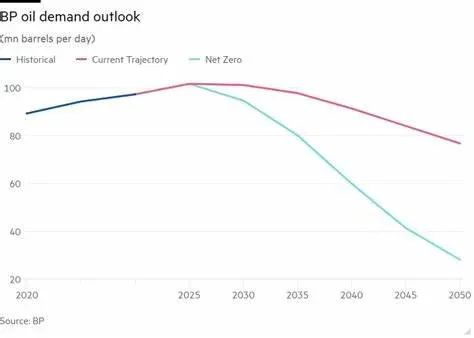
BP Forecasts Rising Oil Demand, Net Zero Target in Doubt
British energy giant BP has released its latest energy outlook, projecting a continued rise in global oil and gas demand over the next two decades. This forecast raises concerns about the feasibility of achieving the internationally agreed-upon goal of net-zero emissions by 2050.
The report suggests that even with significant advancements in renewable energy technologies and increased adoption of electric vehicles, the world’s reliance on fossil fuels will remain substantial. Several factors contribute to this projection, including population growth, expanding economies in developing nations, and the continued demand for oil and gas in sectors such as aviation and heavy industry.
Specifically, BP’s analysis indicates that oil demand is unlikely to peak before the late 2030s, and gas demand will continue to grow for even longer. This contrasts with scenarios outlined by organizations like the International Energy Agency (IEA), which calls for immediate and drastic reductions in fossil fuel consumption to stay on track with net-zero targets.
The implications of BP’s forecast are significant. If the company’s projections prove accurate, it would require even more aggressive efforts in other areas, such as carbon capture and storage, and potentially large-scale deployment of negative emissions technologies, to offset the continued use of fossil fuels.
Critics of the report argue that it may be influenced by BP’s own vested interests in the oil and gas industry. They suggest that the company may be underestimating the potential for renewable energy technologies to displace fossil fuels and overestimating the continued demand for oil and gas. Environmental groups have voiced strong concerns, stating that such forecasts could discourage the urgent action needed to combat climate change.
However, BP defends its analysis, arguing that it is based on realistic assessments of current energy consumption patterns and technological advancements. The company acknowledges the importance of transitioning to a low-carbon economy but believes that oil and gas will continue to play a vital role in meeting global energy needs for the foreseeable future.
The debate over the future of energy highlights the complex challenges involved in tackling climate change. While there is broad agreement on the need to reduce emissions, there is significant disagreement on the pace and scale of the transition. Different stakeholders, including governments, businesses, and individuals, hold varying perspectives on the most effective pathways to achieving net-zero emissions.
- The forecast highlights challenges in meeting net-zero targets.
- Continued reliance on fossil fuels is expected.
- Debate continues on the pace of energy transition.
The BP report serves as a reminder that the transition to a low-carbon economy will require sustained effort, innovation, and collaboration across all sectors of society. It also underscores the importance of considering different perspectives and scenarios as policymakers and businesses make critical decisions about the future of energy.
Ultimately, the success of the net-zero agenda will depend on a combination of factors, including technological breakthroughs, policy support, and shifts in consumer behavior.
Disclaimer: This news article is based on publicly available information and may be subject to updates.




